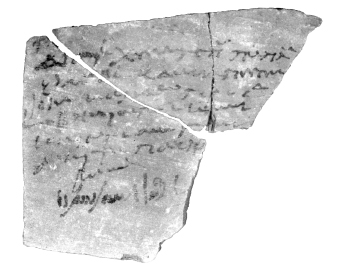The issue of bilingualism is central to my study of the Tebtunis priests. The priests employed Egyptian in “personal” (and, of course, cultic) texts throughout the Roman period—language preference is a more complicated matter—but the use of demotic Egyptian in official contexts drops significantly rather early on—not immediately with the coming of Roman rule, but at some point around the middle of the first century CE. It has been suggested that this decline in the number of extant official documents in demotic reflects Roman actions to privilege Greek in this sphere. (I should note here that Tebtunis and a second Fayum village called Soknopaiou Nesos are the principal Roman sites that have yielded demotic documents on papyrus.)
Farther south, in the region of Thebes, we are presented with another well-documented bilingual environment of Roman date, and recently I have been examining this parallel case, in part because the evidence concerning it is quite rich: Thousands of Theban ostraka (most of them tax receipts) are preserved. As at Tebtunis, the middle of the first century is critical: After 43 CE, demotic ostraka become rare in Thebes, with only a handful stemming from state sources after this date.

I am puzzled by a subset of the Theban ostraka: These are the receipts for which the principal text is in Greek or demotic but that also include a short “memo,” often simply the taxpayer’s name, in the other language. What is the purpose of these memos? Who was responsible for them, the fiscal apparatus or the taxpayer? Or do they not permit generalization, i.e., did the reasons for the practice vary? In the bilingual (personal) archive of Chemtsneus and his son Kabiris (second half of 1st C.), for example, there are 50-odd sherds; the vast majority of these are tax receipts. Four of the Greek receipts, all for the father Chemtsneus, have his name and patronymic written in demotic. No pattern (e.g., involving a banker or the tax collected) emerges from these receipts, and virtually identical receipts exist without the memos. Prima facie, we might suggest that Chemtsneus was illiterate in Greek, that the memos were written for his benefit. But demotic is a “rarefied” script, largely considered to have been confined to hieratic circles, and there is no evidence that Chemtsneus (or Kabiris) moved in such. Perhaps, then, the memos indicate the involvement of temple personnel in the collections documented by the receipts in question? Temple praktores are in fact attested as collectors in a demotic receipt belonging to Chemtsneus, but what the role of such (or similar) individuals might be in these Greek bank receipts is elusive. Chemtsneus does appear to have been living away from his fiscal domicile when the receipts were given, and it might be posited that the memos were for the benefit of the Egyptian collectors of his idia. But the argument that temple collection personnel, even in these early decades of Roman rule, lacked sufficient Greek to identify a taxpayer’s name in a receipt seems dubious. Moreover, why would the memos in question omit the tax paid, its amount, and the date of payment?
